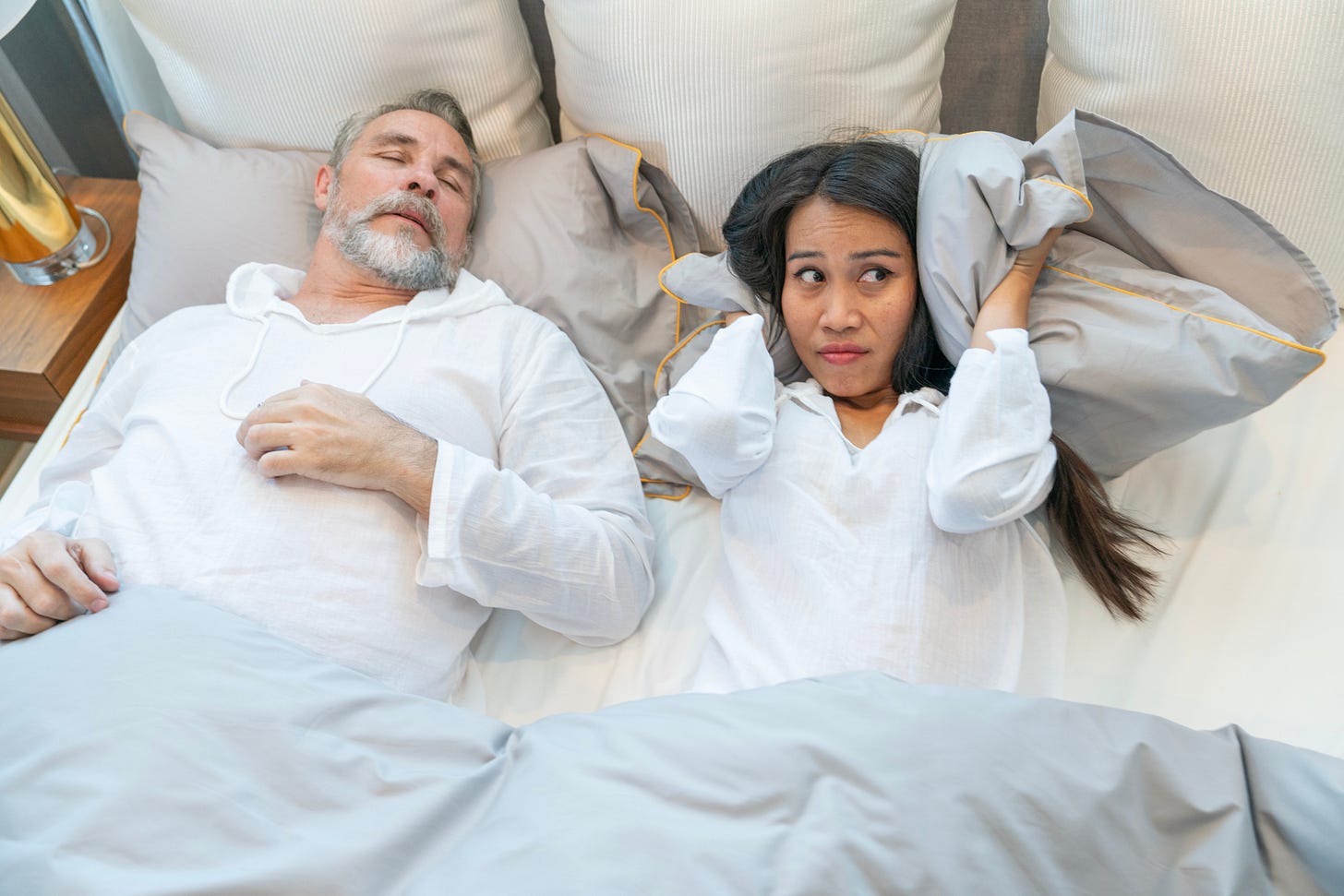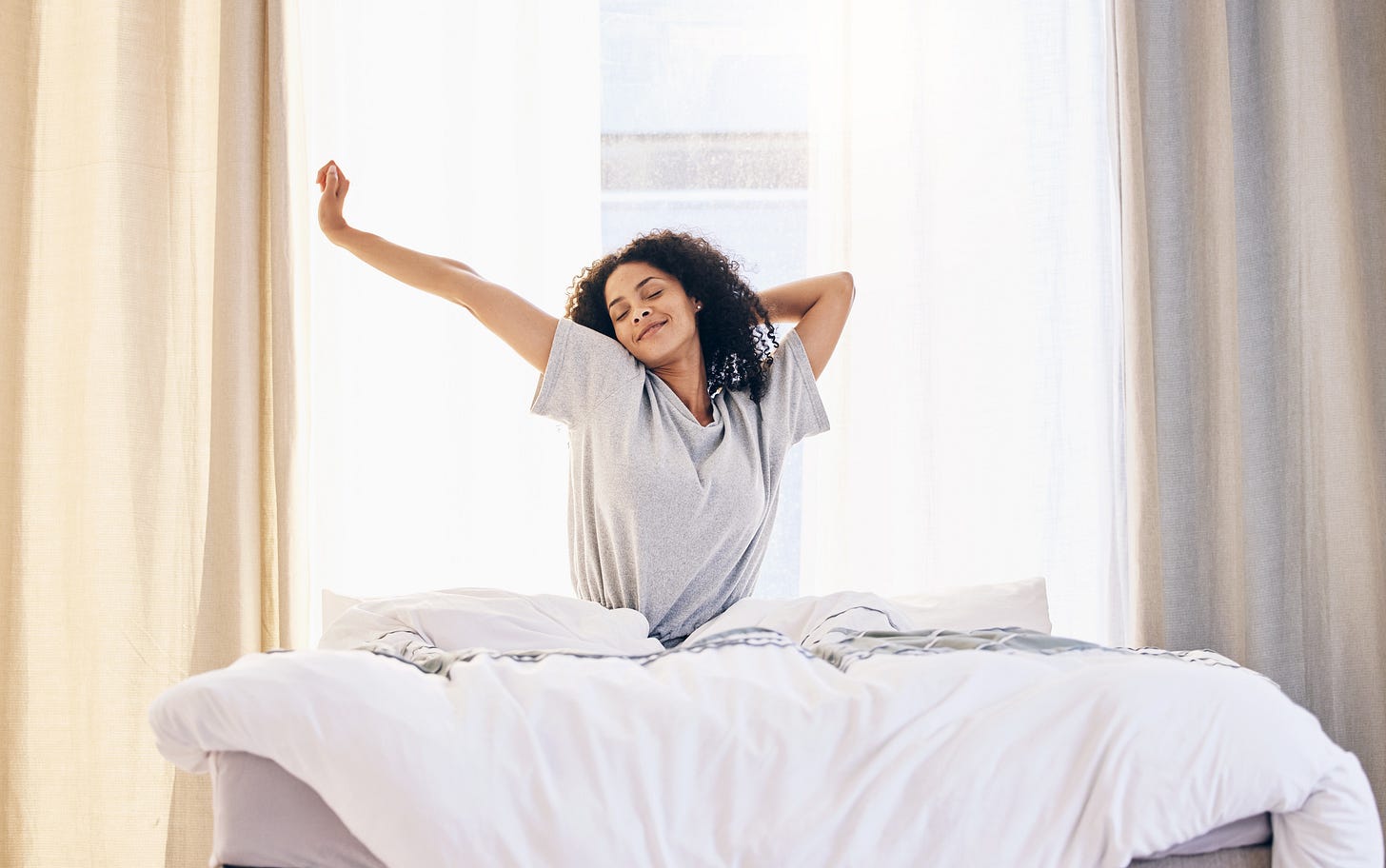Should More Couples Sleep Separately?
What the science says about sleeping alone vs. together
Ever since I can remember, I’ve been a bad sleeper. Starting in my 20s, I began taking sleeping pills — Benadryl at first, then trazodone. When my kids woke me up in the middle of the night, I would sometimes be up for hours, and the meds were the only thing that helped me fall back asleep.
As of a few months ago, however, I’ve been sleep medication-free for the first time in 20 years. At 46, I’m honestly pretty shocked by this — I’m entering perimenopause, so shouldn’t my sleep be getting worse, not better? But there is one potentially relevant factor that could help explain my sudden shift: due to my recent separation, I’m sleeping on my own for the first time in decades.
I have always found sharing a bed with someone else difficult — even when the other person doesn’t make noise or thrash around. When someone lies next to me, it feels as if my nervous system stays on high alert, never fully relaxing, even when I’m asleep. The tiniest movements and sounds wake — and keep — me up.
The Struggles of Bedsharing Women
Both men and women can be sensitive sleepers and have a hard time sharing sleeping spaces. But research suggests women might be especially vulnerable.
In general, we know from the science that women report worse sleep than men and are more likely to experience insomnia. This is true of young and older women alike, but sleep problems often worsen in perimenopause due to hormonal shifts. In a 2023 online survey of more than 2,000 adults from the American Academy of Sleep Medicine, researchers found that women were nearly twice as likely as men to say they rarely or never wake up feeling well rested.
Sleep issues may be especially common among women who share beds with others. One small study found that women sleep more poorly when sharing a bed with a man than when sleeping alone, but that men do not experience the same dip in sleep quality when sharing a bed with a woman. “Male presence may change the arousal thresholds during a woman’s sleep and thus change its efficiency and fragmentation, while similar reactions are not found in men,” the researchers wrote. This sounds a lot like my experience.
Why might this happen? Some research suggests that women generally have a lower arousal threshold than men do, meaning that they awaken more easily. Men may also be rowdier sleepers than women are. They often move more than women do, for one. Men are also more likely than women to have sleep apnea, which is disruptive to partners because it causes heavy snoring (and of course, people with apnea also sleep poorly themselves). One study found that people who sleep with apnea sufferers are three times more likely than others to report sleep problems.
So not only do women, on average, sleep more lightly than men do — men may also be louder and more disruptive in bed, compounding the problem.
Women may not always be aware of these disruptions, though. In one fascinating study, published in 1969, psychologist Lawrence J. Monroe studied how married couples slept when they snoozed separately or together, finding that both men and women — but especially women — slept worse in the presence of their partner in terms of their stage 4 and REM sleep. When the participants were asked how well they thought they slept in each situation, however, they didn’t report any differences. And despite objectively getting better sleep alone, many participants complained that they didn’t like sleeping away from their partners.
What About Sex?
Why do so many of us sleep with partners even when doing so hinders our rest? There are, of course, many reasons. We enjoy sharing the intimacy of slumber with people we love. The presence of another person can provide a sense of safety and comfort. Sleeping separately also requires a certain amount of privilege. In theory, you need a separate bed, a separate room, or at least a couch for the other person to sleep on if you’re not sharing a bed.
Many people worry that sleeping separately — what some people call a “sleep divorce,” a term I hate because of its negative connotations — will also damage their relationship, because their sex lives will dwindle. There isn’t much research on this specific question, but Wendy Troxel, a senior scientist at the RAND Corporation who is also a licensed clinical psychologist and certified behavioral sleep medicine specialist and the author of Sharing the Covers: Every Couple’s Guide to Better Sleep, says that in her experience, couples who sleep apart don’t have less sex.
“Anecdotally, the answer is no,” she said. “In fact, some say that it's enhanced their sex life.” When people sleep separately and get more rest, they often have more energy for and interest in sex, she said. Sometimes, too, the sex becomes more creative and fun because it’s not merely the product of bodily proximity.
I connected with a handful of women — subscribers of this newsletter — who sleep separately from their partners to hear about their experiences. (I’ve changed their names to respect their privacy.)
“Sleeping in separate rooms honestly helped our marriage, because we weren't cranky in general and cranky with each other,” said Libby, a 62-year-old who lives in New York and who has slept separately from her partner for decades.
Thirty-eight-year-old Brianna, who lives in Pennsylvania, said something similar. “For us, feeling obligated to try to make sharing a bed work would've ruined not only our sex life, but also possibly our relationship more generally,” she said. “I am not fun to be around when I'm sleep deprived.”
Troxel’s research has confirmed the link between sleep quality and relationship satisfaction. “The quality of close relationships influences sleep, and sleep disturbances or sleep disorders influence close relationship quality,” she and her colleagues wrote in a 2007 paper.
The Power of Cultural Norms
One of the strongest drivers of bedsharing, however, is social convention. We’ve all been conditioned to believe that sleeping with our partners is the “right” thing to do — it’s considered both a reflection of and a requirement for a healthy relationship.
“We have these societally prescribed beliefs that people hold on to very rigidly, and such stigma attached to sleeping apart,” Troxel said. “For years, I was ashamed to admit that [my husband and I] didn't share a bed or bedroom,” Libby told me. “If I let some comment slip, I'd always get side-eye, or, in the case of family members, concern that my marriage was in trouble.”
Yet the expectation for couples to share a bed doesn’t hold across different cultures or across history. As recently as the 1920s, it was actually trendy for couples to sleep in separate beds, according to research conducted by Lancaster University professor Hilary Hinds. It was only after reproductive rights activist Marie Stopes declared twin beds to be “an invention of the devil” and one of the “enemies of true marriage” that sleeping separately lost its luster. But even today, in Scandinavia and other parts of northern Europe, many couples still do sleep in separate beds.
In the U.S., sleeping separately can still feel like sacrilege — but we may be at the start of another slow pendulum shift. In a 2025 online survey of just over 2,000 U.S. adults commissioned by the American Academy of Sleep Medicine, 31 percent of adults said that they slept in a separate bed or room from their partner. Among 35 to 44-year-olds in particular, the number was even higher, at 39 percent. (Troxel said sleeping separately can be especially helpful for women in perimenopause, when their sleep is already more fragmented and sensitive.) So if you’re considering a sleep separation, know that you are not alone.
Broaching the Topic
Given that many people may sleep better alone, it could make sense for more couples to try it. I do wish there were more science on the issue; Troxel lamented to me that sleep is typically studied as an individual behavior, even though roughly two-thirds of adults sleep with partners.
Obviously, the decision is highly personal — if you love snoozing next to your partner, by all means, keep doing it! I’m not writing this to lure you all over to the “other side,” but to help those of you who might benefit from sleeping alone to recognize that it is a viable (and increasingly popular) option, even if you are happily partnered. If you are curious about it, and your concern is that it’s uncommon or that people will judge you, perhaps it’s time to reconsider. (You also don’t need an extra bedroom, as I’ll explain in a minute — you can absolutely devise creative solutions.)
What if you think your partner will never go for it? There’s a common scenario that Troxel said she encounters in her practice: An exhausted woman comes in, desperately wanting to try sleeping separately, but her partner hates the idea. He feels threatened by it and perceives that he won’t benefit from the arrangement. What then? Troxel explained to me that there are better and worse ways to suggest and discuss the idea — and that framing it constructively can make all the difference.




